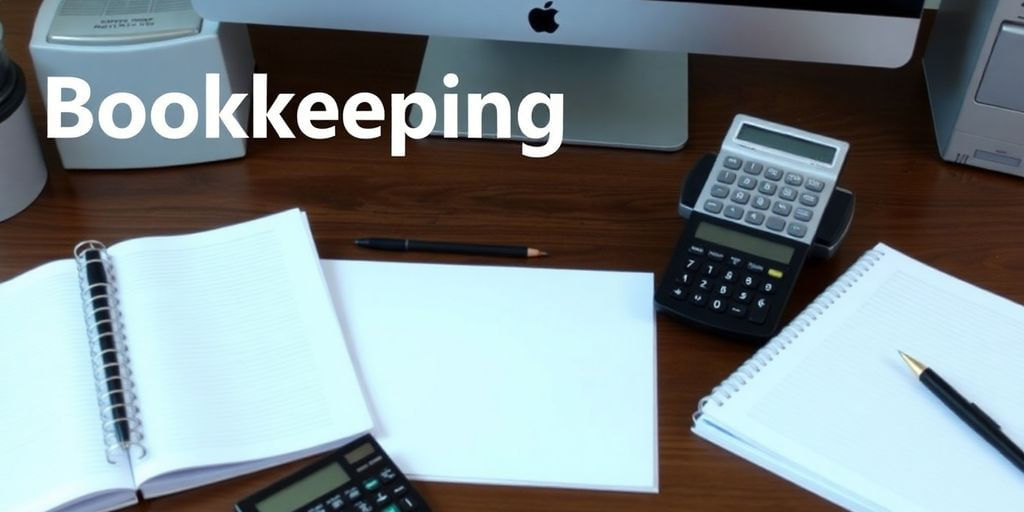
Mastering the Bookkeeping Process: Essential Steps for Small Business Success
Back To BlogUnderstanding The Bookkeeping Process

Why Bookkeeping Matters for Small Businesses
Bookkeeping? Yeah, it might sound boring, but trust us, it's super important, especially when you're running a small business. Think of it as the backbone of your financial health. Without it, you're basically flying blind. We need to know where our money is going, where it's coming from, and how much we actually have. It's not just about taxes (though that's a big part), it's about making smart choices for the future.
Good bookkeeping helps us understand our financial position, manage cash flow, and stay compliant with regulations. It's the foundation for making informed decisions and ensuring our business thrives.
Here's why we think it's so important:
- It helps us track expenses.
- It helps us manage our cash flow.
- It helps us prepare for tax season.
The Basics of Bookkeeping
Okay, so what exactly is bookkeeping? Well, at its core, it's all about recording financial transactions. We're talking about everything from sales and purchases to payments and receipts. It's more than just writing stuff down; it's about organizing that information in a way that makes sense. Think of it like this: we're building a financial story for our business. We need to make sure we have accurate financial reporting so we can make informed decisions.
Here are some key things to keep in mind:
- Accounts: We need to understand the different types of accounts (assets, liabilities, equity, revenue, expenses).
- Double-Entry System: This is the standard method, where every transaction affects at least two accounts.
- Chart of Accounts: This is our master list of all the accounts we use. It's important to master bookkeeping skills to keep our business running smoothly.
Common Bookkeeping Pitfalls to Avoid
Bookkeeping can feel like walking a tightrope, right? One wrong step, and things can get messy fast. We've seen it all – from simple slip-ups to full-blown financial disasters. Let's talk about some common pitfalls we've noticed and how you can dodge them.
Mixing Personal and Business Finances
Okay, this one's huge. It's like trying to untangle a ball of yarn after your cat's had its way with it. Seriously, don't do it! Keep your personal and business finances completely separate. Open a separate business bank account and get a business credit card. It makes everything easier, especially when tax time rolls around. Trust us, your accountant will thank you. It's a key part of bookkeeping for small business.
Ignoring Regular Reconciliation
Reconciliation? Sounds boring, I know. But think of it as a financial health check. It's where you compare your records with your bank statements to make sure everything matches up. If you skip this, errors can pile up, and before you know it, you're dealing with a major headache. Make it a monthly habit. Set a reminder, grab a coffee, and get it done. You'll be surprised at how many little discrepancies you catch. It's also important to have online bookkeeping services for small business in place.
Think of reconciliation as your financial detective work. It helps you spot any suspicious activity, like unauthorized transactions or missing deposits. It's a simple step that can save you a lot of trouble down the road.
When To Seek Professional Help

Let's be real, sometimes we get in over our heads. Bookkeeping can get tricky, and there's no shame in admitting you need help. We've found that knowing when to call in a pro can save us a ton of stress and potential headaches down the line. It's all about recognizing when our time is better spent elsewhere, focusing on what we do best – running our business!
Signs You Need a Bookkeeper
Okay, so how do we know when it's time to wave the white flag and bring in a bookkeeper? Well, a few signs usually pop up. First, if we're spending way too much time on bookkeeping tasks and it's taking away from other important stuff, that's a big red flag. Our time is valuable, and we need to use it wisely. Another sign? If we're constantly stressed about taxes or unsure if we're even doing things right.
Here's a quick checklist:
- We're working crazy hours just to keep up with the books.
- We're terrified of making a mistake that could cost us money.
- We have no idea what a balance sheet is (and don't want to learn!).
- Our business is growing fast, and the bookkeeping is getting more complex.
Basically, if bookkeeping is causing more anxiety than it's worth, it's time to consider getting some help. It's an investment in our peace of mind and the future of our business.
Finding the Right Professional
So, we've decided to get help. Great! Now, how do we find the right person? It's not as simple as picking the first name we see. We need to do a little digging. First, think about what we need. Do we just need someone to handle the basics, or do we need someone who can offer financial advice and help us plan for the future? Once we know what we're looking for, we can start our search. Ask other business owners for referrals. Check online reviews. And most importantly, talk to a few different people before making a decision. Make sure they understand our business and that we feel comfortable working with them. Don't be afraid to ask about their experience, their qualifications, and their fees. Finding the right small business bookkeeping services is like finding the right partner – it takes time and effort, but it's worth it in the end.
If you're feeling overwhelmed or stuck, it might be time to talk to someone who can help. Don't hesitate to reach out for support. Visit our website to learn more about how we can assist you on your journey to feeling better!
Frequently Asked Questions
What is bookkeeping and why is it important for small businesses?
Bookkeeping is the process of recording and organizing all financial transactions of a business. It helps small businesses keep track of their money, manage cash flow, and make informed decisions.
What are some common mistakes to avoid in bookkeeping?
Some common mistakes include mixing personal and business finances, not keeping receipts, and failing to regularly check your accounts. Keeping things separate and organized can help prevent these issues.
When should I consider hiring a professional bookkeeper?
You might want to hire a bookkeeper if your business is growing and you can't keep up with the financial tasks, or if you're having trouble keeping your records accurate and compliant with tax laws.
